News & Commentary
Jun 24, 2014
ACLU of New Mexico Condemns APD Spying on Protesters, Files Public Records Request for Surveillance Data
###
By Micah McCoy
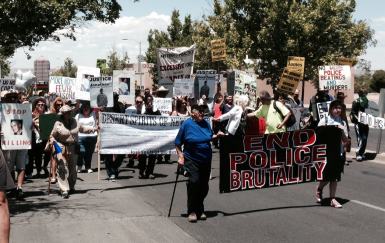
Jun 09, 2014
“APD Forward” Campaign to Reform Albuquerque Police Department Launched
ALBUQUERQUE, NM—Today, Albuquerque community leaders and a broad spectrum of New Mexico-based organizations announced the launch of the APD Forward campaign, a community-driven effort to hold the City of Albuquerque and the Albuquerque Police Department (APD) accountable for implementing reforms of the city’s police department. APD Forward will serve as a powerful, targeted platform for Albuquerque communities to press for sustainable reforms of APD policies and procedures.
By Micah McCoy
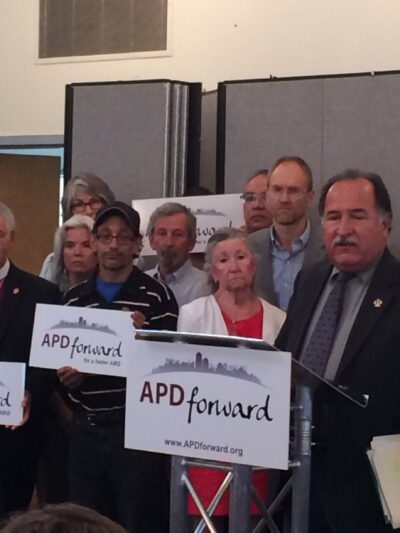
Mar 27, 2014
ACTION ALERT: Ask ABQ Mayor Berry to Reform APD
On Sunday, March 16, the Albuquerque Police Department (APD) sent a heavily armed unit to confront James Boyd, a homeless man who was "camping illegally" in the Sandia Foothills. The encounter ended with officers shooting and killing him. This is just the la
By Micah McCoy

Mar 06, 2014
Woman Sues Her Former Parole Officer for Violating Her Civil Rights
ACLU of New Mexico files lawsuit on behalf of Albuquerque woman who was sexually assaulted by her parole officer
By Micah McCoy
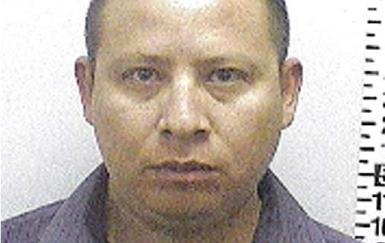
Mar 04, 2014
ACLU Demands NM Law Enforcement Academy Release Training Materials
ALBUQUERQUE, NM—Today, the American Civil Liberties Union (ACLU) of New Mexico filed an Inspection of Public Records Request (IPRA) with the New Mexico Law Enforcement Academy (NMLEA) seeking the training standards and lesson plans used to train officers. This records request comes after the academy director publicly vowed to “burn” any training materials before releasing them to the public.
By Micah McCoy

Dec 18, 2013
ACLU of Texas and New Mexico Sue Feds, County for Invasive Cavity Searches of Woman at U.S.-Mexico Border
EL PASO, TX – Agents with U.S. Customs and Border Protection (CPB), working with medical professionals, subjected a U.S. citizen to a series of highly invasive searches—including rectal and vaginal probes—without a warrant, according to charges in a lawsuit filed today by the American Civil Liberties Union (ACLU) of Texas and the ACLU of New Mexico. CBP agents frisked and strip-searched the plaintiff at a border checkpoint, then transported her in handcuffs to the University Medical Center of El Paso, where doctors subjected her to an observed bowel movement, X-ray, speculum exam, rectal exam, vaginal exam, and a CT scan. After a period of six hours of fruitless searches, the agents released the plaintiff without charge. “What is truly frightening about this incident is that it could have happened to anyone,” said ACLU-NM Legal Director Laura Schauer Ives. “The failed drug war and militarized border region have created an environment in which law enforcement officials increasingly inflict extreme and illegal searches on innocent Americans. We need to ensure that no one is ever again subjected to a nightmare like our client suffered.” The plaintiff, a 54 year old woman from New Mexico, was attempting to return to the U.S. from Mexico via a bridge in El Paso. She is deeply traumatized by the cavity searches government agents forced her to endure and continues to suffer emotional and psychological after effects. “Securing the border has become an excuse for outright abandonment of Constitutional principles that protect our privacy and dignity,” said Adriana Piñon, senior staff attorney at the ACLU of Texas. “Enough is enough. The hand of the government should never have unfettered power to invade our most intimate bodily spaces.” The suit comes as the nation debates a “border surge” that would further militarize border communities despite strong criticism of increased civil rights abuses along the border. ACLU affiliates and other civil rights advocates along the Southwest border have challenged a pattern of unlawful conduct by local and federal law enforcement personnel this year: In November, 2013 an Albuquerque civil rights law firm
By Micah McCoy
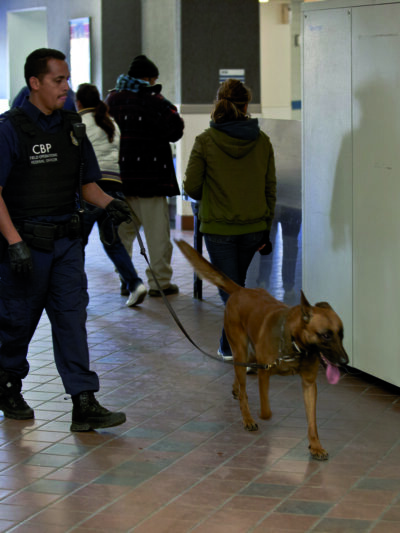
Aug 14, 2013
City of Albuquerque Settles with ACLU Plaintiffs for Police Oversight Commission’s Free Speech Violation
ALBUQUERQUE, NM—Yesterday, the American Civil Liberties Union (ACLU) of New Mexico and the City of Albuquerque settled a lawsuit claiming that the Police Oversight Commission unconstitutionally suppressed the speech of several citizens during a meeting last December. The plaintiffs in this case, Charles Arasim, Kenneth Ellis, Silvio Dell’Angela and Eli Chavez, are all community advocates against police use of excessive force. The settlement raises several procedural reforms to the Commission’s rules designed to promote the right to free speech and citizen involvement and a sum of $14,000 in damages and attorneys’ fees.
By Micah McCoy
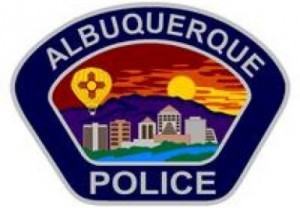
Stay Informed
Sign up to be the first to hear about how to take action.
By completing this form, I agree to receive occasional emails per the terms of the ACLU’s privacy statement.
By completing this form, I agree to receive occasional emails per the terms of the ACLU’s privacy statement.
